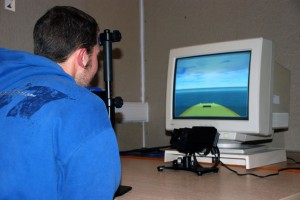Simulators for P1 racers
Simulation technology is being introduced for powerboat racing…
It is no secret that motorsport’s Formula One teams have been using technically advanced simulators for many years, to develop both car and driver performance without the need to physically test on a track. And now, thanks to a new partnership between the P1 Marine Foundation and Southampton University, simulator technology is being introduced into powerboat racing in a move that could revolutionise driver training and play a part in championships such as P1’s SuperStock series. The simulators are designed to provide the most immersive racing experience possible outside of a boat, allowing a driver to run through the track lay-out and handling without going near the water. But it is a very complex process, with researchers having to consider not just the huge number of factors influencing a boat during a race, but also how it is driven by the pilot. A university spokesman said: “This project forms part of a wider research programme into the design of high-performance craft that more effectively reduce human exposure to shock and vibration. We anticipate that the simulator will provide a valuable training platform for powerboat drivers and will allow them to gain experience of driving powerboats at high speed in a variety of realistic sea conditions without exposing them to the high levels of vibration and repeated shock.”
The simulators are designed to provide the most immersive racing experience possible outside of a boat, allowing a driver to run through the track lay-out and handling without going near the water. But it is a very complex process, with researchers having to consider not just the huge number of factors influencing a boat during a race, but also how it is driven by the pilot. A university spokesman said: “This project forms part of a wider research programme into the design of high-performance craft that more effectively reduce human exposure to shock and vibration. We anticipate that the simulator will provide a valuable training platform for powerboat drivers and will allow them to gain experience of driving powerboats at high speed in a variety of realistic sea conditions without exposing them to the high levels of vibration and repeated shock.”
Alongside the high-speed craft simulator project, the University has also been engaged with the P1 Marine Foundation investigating the effect of propeller immersion on engine power and torque requirements and sustainable alternatives to glass reinforced polymer construction for increased toughness.














